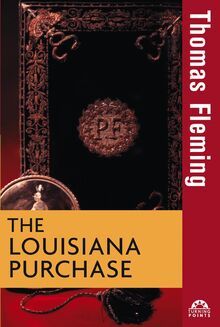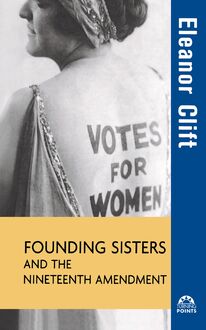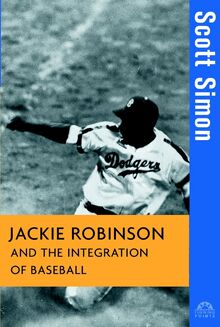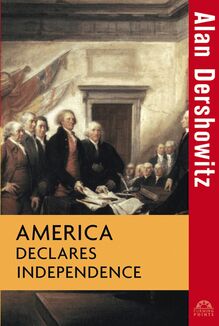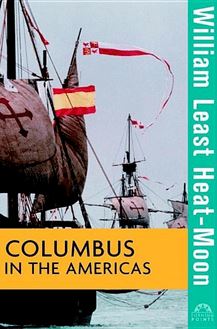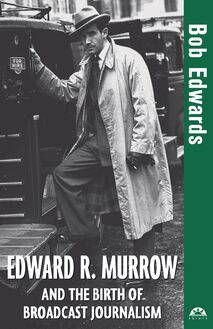The Louisiana Purchase , livre ebook
65
pages
English
Ebooks
2007
Vous pourrez modifier la taille du texte de cet ouvrage
Obtenez un accès à la bibliothèque pour le consulter en ligne En savoir plus
Découvre YouScribe en t'inscrivant gratuitement
Découvre YouScribe en t'inscrivant gratuitement
65
pages
English
Ebooks
2007
Vous pourrez modifier la taille du texte de cet ouvrage
Obtenez un accès à la bibliothèque pour le consulter en ligne En savoir plus
Publié par
Date de parution
20 août 2007
Nombre de lectures
1
EAN13
9780470253687
Langue
English
Like many other major events in world history, the Louisiana Purchase is a fascinating mix of destiny and individual energy and creativity. . . . Thomas Jefferson would have been less than human had he not claimed a major share of the credit. In a private letter . . . the president, reviving a favorite metaphor, said he "very early saw" Louisiana was a "speck" that could turn into a "tornado." He added that the public never knew how near "this catastrophe was." But he decided to calm the hotheads of the west and "endure" Napoleon's aggression, betting that a war with England would force Bonaparte to sell. This policy "saved us from the storm." Omitted almost entirely from this account is the melodrama of the purchase, so crowded with "what ifs" that might have changed the outcome-and the history of the world.
The reports of the Lewis and Clark expedition . . . electrified the nation with their descriptions of a region of broad rivers and rich soil, of immense herds of buffalo and other game, of grassy prairies seemingly as illimitable as the ocean. . . . From the Louisiana Purchase would come, in future decades, the states of Arkansas, Missouri, Iowa, Nebraska, South Dakota, and large portions of what is now North Dakota, Montana, Wyoming, Minnesota, Colorado, and Louisiana. For the immediate future, the purchase, by doubling the size of the United States, transformed it from a minor to a major world power. The emboldened Americans soon absorbed West and East Florida and fought mighty England to a bloody stalemate in the War of 1812. Looking westward, the orators of the 1840s who preached the "Manifest Destiny" of the United States to preside from sea to shining sea based their oratorical logic on the Louisiana Purchase.
TURNING POINTS features preeminent writers offering fresh, personal perspectives on the defining events of our time.
1. Idealist at Work.
2. Realist at Work.
3. The Game Begins.
4. Frustration All Around.
5. Aedes Aegypti to the Rescue.
6. The Dying General.
7. A War Hero to the Rescue.
8. Between Peace and War.
9. All Eyes on Paris.
10. The Big Bargain.
11. Hanging Fire.
12. Constitution Bending in Washington D.C.
13. Triumph—and New Perils.
14. Destiny Takes Charge.
15. The Final Challenge.
Further Reading.
Publié par
Date de parution
20 août 2007
Nombre de lectures
1
EAN13
9780470253687
Langue
English
The Louisiana Purchase
Preeminent writers offering fresh, personal perspectives on the defining events of our time
Published Titles
William Least Heat-Moon, Columbus in the Americas
Scott Simon, Jackie Robinson and
the Integration of Baseball
Alan Dershowitz, America Declares Independence
Thomas Fleming, The Louisiana Purchase
Forthcoming Titles
Douglas Brinkley on the March on Washington
William F. Buckley Jr. on the Fall of the Berlin Wall
Eleanor Clift on Passing the 19th Amendment
Sir Martin Gilbert on D-Day
Martin Goldsmith on the Beatles Coming to America
The Louisiana Purchase
T HOMAS F LEMING
Copyright 2003 by Thomas Fleming. All rights reserved
Published by John Wiley Sons, Inc., Hoboken, New Jersey Published simultaneously in Canada
Design and production by Navta Associates, Inc.
No part of this publication may be reproduced, stored in a retrieval system, or transmitted in any form or by any means, electronic, mechanical, photocopying, recording, scanning, or otherwise, except as permitted under Section 107 or 108 of the 1976 United States Copyright Act, without either the prior written permission of the Publisher, or authorization through payment of the appropriate per-copy fee to the Copyright Clearance Center, 222 Rosewood Drive, Danvers, MA 01923, (978) 750-8400, fax
(978) 750-4470, or on the web at www.copyright.com . Requests to the Publisher for permission should be addressed to the Permissions Department, John Wiley Sons, Inc., 111 River Street, Hoboken, NJ 07030, (201) 748-6011, fax (201) 748-6008, e-mail: permcoordinator@wiley.com .
Limit of Liability/Disclaimer of Warranty: While the publisher and the author have used their best efforts in preparing this book, they make no representations or warranties with respect to the accuracy or completeness of the contents of this book and specifically disclaim any implied warranties of merchantability or fitness for a particular purpose. No warranty may be created or extended by sales representatives or written sales materials. The advice and strategies contained herein may not be suitable for your situation. You should consult with a professional where appropriate. Neither the publisher nor the author shall be liable for any loss of profit or any other commercial damages, including but not limited to special, incidental, consequential, or other damages.
For general information about our other products and services, please contact our Customer Care Department within the United States at (800) 762-2974, outside the United States at (317) 572-3993 or fax (317) 572-4002.
Wiley also publishes its books in a variety of electronic formats. Some content that appears in print may not be available in electronic books. For more information about Wiley products, visit our web site www.wiley.com .
Library of Congress Cataloging-in-Publication Data:
Fleming, Thomas J.
The Louisiana Purchase / Thomas Fleming.
p. cm. - (Turning points)
ISBN 0-471-26738-4 (Cloth)
1. Louisiana Purchase. I. Title. II. Turning points (John Wiley Sons)
E333 .F56 2003
973.4'6-dc21
2002156131
Printed in the United States of America
10 9 8 7 6 5 4 3 2 1
Contents
1. Idealist at Work
2. Realist at Work
3. The Game Begins
4. Frustration All Around
5. Aedes Aegypti to the Rescue
6. The Dying General
7. A War Hero to the Rescue
8. Between Peace and War
9. All Eyes on Paris
10. The Big Bargain
11. Hanging Fire
12. Constitution Bending in Washington, D.C.
13. Triumph-and New Perils
14. Destiny Takes Charge
15. The Final Challenge
Further Reading
1
Idealist at Work
The greatest diplomatic triumph in the history of the United States began with a blunder. In July 1801, four months after Thomas Jefferson took over the presidential palace, as the unfinished White House was then called, Louis Andre Pichon, the affable young charg d affaires of the French Republic, visited the United States new chief executive. That such a low-ranking diplomat was France s sole spokesman in the new U.S. capital was stark evidence of the strained relations between the world s only two republics. Normally an ambassador would be on hand to handle such an important relationship.
From 1798 to 1800, France and the United States had fought a vicious, undeclared war at sea in which French privateers and frigates had despoiled a staggering $12 million in U.S. ships and cargoes (the modern equivalent of almost $200 million). American men-of-war had slugged it out ship to ship with many of these depredators. Fearful of a French invasion, George Washington had emerged from retirement to head a ten thousand-man U.S. army, and appointed General Alexander Hamilton as its field commander.
The war had emerged as a byproduct of the larger war France was waging with England. The French were furiously resentful over what they considered American treachery-the United States refusal to honor the treaty of alliance it had signed with King Louis XVI in 1778, which had enabled the new republic to win independence from England.
President George Washington had declared the United States neutral in the struggle that erupted between Revolutionary France and England in 1793. He had decided that the French Republic, having beheaded Louis XVI, was no longer the same country with whom the United States had been allied during its revolution. France-and numerous French partisans in the United States-thought there was a distinctly pro-English tilt to this international balancing act. Washington s successor, President John Adams, partly agreed with this view, and had sent three commissioners to Europe to negotiate an end to the so-called Quasi-War.
Louis Andre Pichon had acted as secretary of the French delegation to this parley and played a major role in working out an agreement that called for a firm, inviolable and universal peace. But many skeptical Americans, notably members of the Federalist Party led by Jefferson s chief rival, General Alexander Hamilton, still nursed violently antagonistic feelings toward France. They found special grounds for complaint about this treaty, in which the United States had abandoned millions of dollars in claims by U.S. merchants for losses in the Quasi-War. In return, France agreed to release the United States from the Treaty of 1778, which the Federalists considered already defunct.
Thomas Jefferson was not one of these Francophobes. On the contrary, the tall, red haired, freckle-faced president greeted Pichon warmly as the spokesman for a country that stirred his deepest political emotions. For the previous nine years, Jefferson had defended the French Revolution against fierce criticism in the United States. Even when France collapsed into an orgy of mob rule and raw terror in 1793-1794, Jefferson retained his faith in the revolution s redeeming value. Repeatedly he had insisted that the liberty of the whole earth depended on a French victory against England and the other European powers that had assailed France after Louis XVI s execution. Rather than permit this cause to fail, Jefferson told one friend, he would have seen half the earth desolated.
Jefferson s followers, who soon coalesced into the Republican Party, often expressed this vehement opinion in riotous demonstrations in the streets of New York and other cities. President Washington viewed these numerous, so-called Democratic Societies as seedbeds of insurrection. Their behavior, combined with the far worse excesses of the French Revolution, convinced conservatives that liberty and equality were dangerous ideas. This conviction became part of the Federalist Party s gospel.
Pichon was hoping for a demonstration of Jefferson s friendship for France. The young charg asked the president about U.S. policy toward the troubled island of Santo Domingo. Then, as now, it was divided into a French-speaking western third (the future republic of Haiti) and a Spanish-speaking eastern two thirds (the future Dominican Republic) with a range of mountains as a geographical barrier between them. Spain had ceded the Spanish part of the island to France in 1795. The French section s sugar, coffee, and indigo plantations once made it France s most valuable overseas possession. The French Revolution had triggered a civil war that wrecked the economy.
Out of the turmoil emerged an extraordinary black leader, Toussaint L Ouverture, who ruled both enclaves, in which some four hundred thousand ex-slaves lived uneasily with thousands of whites and free mulattoes. Toussaint was immensely proud of his martial prowess and did not complain when his followers called him the Bonaparte of the Antilles.
Pichon, who spoke excellent English, asked Jefferson what the United States would do if France tried to regain control of Santo Domingo. Would it support such an effort? A smiling Jefferson replied that nothing would be easier than to supply everything for your army and navy, and to starve out Toussaint.
This was a startling reversal of the policy of President John Adams, who had seen L Ouverture s emergence as an opportunity to frustrate British and French imperialism in the Caribbean. Adams and his secretary of state, Timothy Pickering, had shipped L Ouverture s army food and ammunition, which helped them defeat a British army that attempted to seize Santo Domingo. They also sent Edward Stevens, an old friend of Alexander Hamilton, to the island s major port, Cap Francois, where he became L Ouverture s trusted friend and adviser and urged him to declare independence.
Jefferson assured Pichon that most Americans had no enthusiasm for an independent Santo Domingo ruled by a black dictator, who was a walking, talking threat to the peace and prosperity of every American state with large numbers of slaves. In September 1800, Virginia had been badly shaken by an aborted rebellion led by two free Africans, Gabriel Prosser, a Richmond blacksmith, and his brother Martin, an itinerant preacher.
Jefferson also told P
